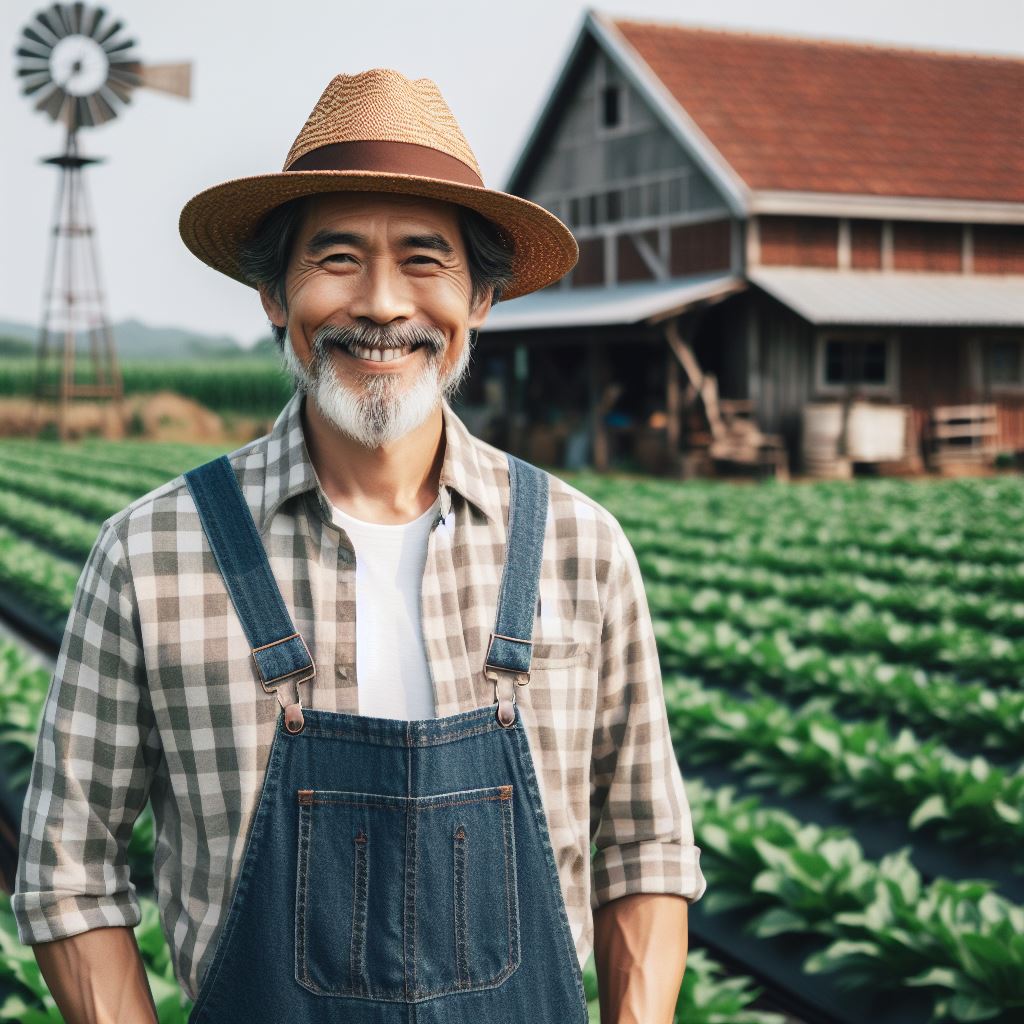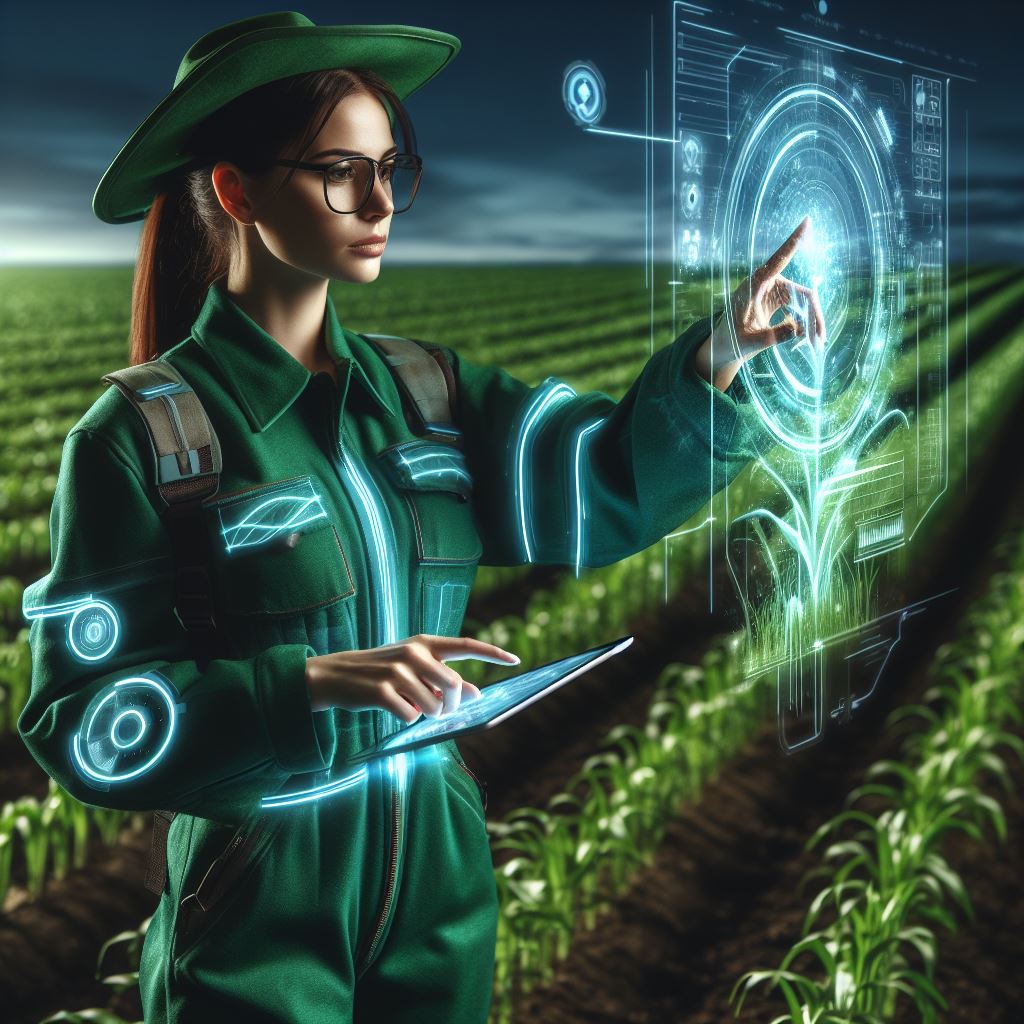Introduction
Agriculture, vital for sustenance, undergoes remarkable changes with rapid technological advancements shaping tomorrow’s farming landscape.
- Importance of Agriculture: Agriculture is crucial, providing food, raw materials, and economic stability, impacting global well-being.
- Advancements in Farming Technology: The agricultural sector experiences swift transformations, integrating cutting-edge technologies for enhanced productivity.
Overview of Futuristic Farm Tools
- Introduction to Futuristic Tools: Explore the realm of tomorrow’s agriculture, where innovative tools redefine efficiency, sustainability, and productivity.
- Precision Farming: Futuristic tools emphasize precision, ensuring optimal resource utilization and minimizing environmental impact for sustainable farming practices.
- Robotics and Automation: The integration of robotics and automation revolutionizes farming tasks, reducing manual labor and enhancing overall operational efficiency.
- Drones and AI: Unmanned aerial vehicles equipped with artificial intelligence monitor crops, providing real-time insights for better decision-making and improved yields.
- Smart Sensors: Advanced sensors offer real-time data on soil health, weather conditions, and crop status, empowering farmers to make informed choices.
- Genetic Engineering: Explore genetic advancements shaping crops with improved yields, resilience, and nutritional value, ensuring food security in a changing world.
In short, the evolution of futuristic farm tools signifies a promising era for agriculture, where innovation harmonizes with the age-old practice, paving the way for sustainable, efficient, and resilient farming.
Current Challenges in Agriculture
Agriculture, as one of the oldest occupations known to mankind, is not exempt from facing challenges in the modern world.
Despite advancements in technology and the use of machinery, farmers still encounter various obstacles that hinder their productivity and sustainability.
Current challenges faced in agriculture
- Climate Change Threat: Altering weather patterns pose a real threat, causing droughts, floods, and heatwaves, disrupting farming plans.
- Depleting Resources: Growing global demand strains water, soil, and energy resources; excessive use of fertilizers and pesticides worsens environmental impact.
- Biodiversity Loss: Monoculture harms biodiversity, disrupts ecosystems, reduces natural pest control, and increases vulnerability to diseases and pests.
- Labor Shortage: Agriculture’s waning appeal to the younger generation leads to a skilled labor shortage, hindering farming efficiency.
- Food Insecurity: Despite sufficient global food production, unequal distribution, inadequate storage, and post-harvest losses contribute to food insecurity.
- Rising Production Costs: Increasing costs for seeds, fertilizers, machinery, and fuel challenge small-scale farmers, jeopardizing profitability and farm abandonment.
- Market Access Hurdles: Complex regulations, trade barriers, and unfair competition impede farmers’ market access and export opportunities.
- Technological Adoption Gap: Despite advancements, farmers, especially in developing countries, lack access to essential tools and knowledge, hindering productivity.
The need for innovative solutions
In order to overcome these challenges, innovative solutions are imperative for the future of agriculture.
Here are some potential approaches:
- Sustainable Farming Practices: Implementing sustainable farming practices such as organic farming, agroforestry, and crop rotation can help mitigate the effects of climate change, preserve natural resources, and promote biodiversity.
- Precision Agriculture: Utilizing technologies like satellite imagery, drones, and sensors can enable farmers to make informed decisions regarding water and fertilization, reducing wastage and minimizing the environmental impact.
- Vertical Farming and Indoor Agriculture: Maximizing space utilization by growing crops vertically in controlled environments can optimize production, minimize water usage, and reduce transportation costs.
- Genetic Engineering and Crop Improvement: Developing genetically modified crops with enhanced resistance to pests, diseases, and environmental stressors can boost yields while reducing the need for chemical inputs.
- Data-driven Decision Making: Collecting and analyzing data on weather, soil conditions, and market trends can empower farmers to make informed decisions, improve productivity, and enhance market access.
- Encouraging Youth Engagement: Promoting agricultural education, providing financial incentives, and creating a supportive ecosystem can attract younger generations to farming, ensuring a sustainable future for agriculture.
In fact, agriculture continues to face several challenges that threaten global food security, environmental sustainability, and the livelihoods of farmers.
However, by embracing innovative solutions and adopting sustainable practices, we can overcome these obstacles and pave the way for a prosperous and resilient agricultural sector.
It is crucial for governments, organizations, and individuals to work together to address these challenges and secure the future of tomorrow’s agriculture.
Read: Crop Rotation Secrets for Healthy Soil
Introduction to Futuristic Farm Tools
- Futuristic farm tools refer to advanced agricultural equipment designed to enhance efficiency and sustainability.
- These tools incorporate cutting-edge technology, automation, and artificial intelligence to streamline farming processes.
- They have the potential to revolutionize agriculture by increasing productivity, reducing labor, and minimizing environmental impact.
Benefits of Futuristic Farm Tools
- Increased Efficiency: Futuristic farm tools enable farmers to perform tasks quicker and with higher precision.
- Automation: These tools automate various farming operations, reducing the need for manual labor.
- Artificial Intelligence: By utilizing AI, futuristic farm tools can analyze data and make informed decisions, optimizing resource allocation.
- Precision Agriculture: These tools enable farmers to precisely monitor and manage crop health, leading to higher yields and reduced wastage.
- Sustainable Practices: Futuristic farm tools promote sustainable farming methods by optimizing resource usage, minimizing chemical inputs, and reducing waste.
- Enhanced Crop Quality: With advanced monitoring capabilities, farmers can identify issues early and take corrective measures, ensuring high-quality produce.
- Minimized Environmental Impact: Futuristic farm tools reduce the use of water, fertilizers, and pesticides, leading to a decreased ecological footprint.
Futuristic Farm Tools
- Autonomous Tractors: These self-driving tractors can perform various tasks such as plowing, seeding, and harvesting without human intervention.
- Drone Technology: Drones equipped with sensors and cameras can monitor crops, detect pests, and even spray pesticides with precision.
- Robotic Milkers: Automated systems that milk cows, ensuring efficiency and reducing the physical strain on farmers.
- Smart Irrigation Systems: These systems use sensors to monitor soil moisture levels and adjust watering accordingly, conserving water usage.
- Vertical Farming: Futuristic farms utilize vertical space and controlled environments to grow crops indoors, maximizing productivity and conserving land.
- Smart Livestock Monitoring: Sensors and wearable devices track the health and behavior of livestock, enabling early detection of illnesses and optimizing breeding programs.
- Smart Greenhouses: These enclosed structures use technology to control temperature, humidity, and lighting, creating an ideal environment for plant growth.
Futuristic farm tools offer tremendous potential to transform agriculture, making it more efficient, sustainable, and productive.
By utilizing advanced technology and automation, these tools enable farmers to optimize their operations and mitigate challenges.
From autonomous tractors to smart irrigation systems, the possibilities for improving farming practices are endless.
Investment in research and development, coupled with the adoption of these innovative tools, can lead to a future where agriculture thrives while minimizing its impact on the environment.
The era of futuristic farm tools dawns upon us, promising a revolution in the way we cultivate, harvest, and sustain our food sources.
Read: Soil Test Kits: Choosing the Right One

Types of Futuristic Farm Tools
Automated Robotics
Autonomous robots are increasingly being used in farming for various tasks.
These robots can operate on their own without human intervention.
They can perform activities such as planting seeds, harvesting crops, and removing weeds.
The use of autonomous robots in farming has several benefits. It reduces the labor required for manual farming tasks.
Transform Your Agribusiness
Unlock your farm's potential with expert advice tailored to your needs. Get actionable steps that drive real results.
Get StartedThese robots can work around the clock, increasing efficiency and productivity in the agricultural sector.
Precision Agriculture Technologies
Precision agriculture tools involve the use of advanced technologies for data gathering and analysis.
These tools can collect data on soil moisture, nutrient levels, and crop growth patterns.
By analyzing this data, farmers can make informed decisions about fertilization, irrigation, and pest control.
Precision agriculture optimizes crop yield by providing tailored solutions for each specific area of a farm.
It minimizes resource waste by ensuring that fertilizers and water are used efficiently.
Vertical Farming
Vertical farming is a technique that involves growing crops indoors in stacked layers or vertically inclined surfaces.
This method can maximize space utilization and increase the yield of crops.
Vertical farms often use hydroponic or aeroponic systems, eliminating the need for soil.
Growing crops indoors also enables farmers to control environmental factors such as temperature, humidity, and lighting.
Drones and Remote Sensing
Drones and remote sensing technologies are revolutionizing the farming industry.
They can be used for crop monitoring, pest control, and data collection.
Drones equipped with cameras and infrared sensors can identify diseases, pests, and nutrient deficiencies in crops.
Remote sensing technologies provide farmers with detailed information about the health and growth of their crops.
These tools allow for early detection of problems, leading to quicker and more targeted interventions.
In general, futuristic farm tools such as automated robotics, precision agriculture technologies, vertical farming, drones, and remote sensing are transforming the agricultural industry.
These tools offer numerous benefits, including increased productivity, optimized crop yield, and reduced resource waste.
As technology continues to advance, we can expect further innovations in farming tools that will shape the future of agriculture.
Read: Organic Matter: Boosting Soil Quality
Explore Further: Maximizing Yields with Organic Fertilizers
Discover More: Innovative Weed Eradication for Farmers
Benefits of Futuristic Farm Tools
Increased Efficiency
Advanced technology improves farming processes, resulting in increased efficiency on the farm.
Time-saving and labor-reducing tools, such as automated irrigation systems and robotic harvesters, contribute to this efficiency.
Enhanced Sustainability
Futuristic farm tools offer several environmental benefits, promoting sustainability in agriculture.
These tools reduce water and fertilizer usage, resulting in a lower carbon footprint.
Improved Crop Quality and Yield
Farmers can optimize crop growth and quality with the use of futuristic farm tools.
Through the precise application of resources and monitoring systems, these tools ensure healthier plants and higher yields.
Showcase Your Farming Business
Publish your professional farming services profile on our blog for a one-time fee of $200 and reach a dedicated audience of farmers and agribusiness owners.
Publish Your ProfileIncreased Production and Profit Potential
By utilizing futuristic farm tools, farmers can achieve increased production levels and unlock higher profit potential.
The efficiency and quality improvements provided by these tools contribute to this growth.
Futuristic farm tools offer numerous benefits, including increased efficiency, enhanced sustainability, improved crop quality, and increased production and profit potential.
By embracing these tools, farmers can revolutionize agriculture, paving the way for a more efficient and sustainable future.
Read: Crop-Specific Soil Prep Techniques
Future Implications and Challenges
Futuristic farm tools have the potential to revolutionize agriculture in numerous ways.
These advanced technologies bring forth both opportunities and challenges that need to be considered in order to fully harness their benefits.
The potential impact of futuristic farm tools on agriculture
The potential impact of futuristic farm tools on agriculture is undeniable.
These tools can significantly increase efficiency and productivity, allowing farmers to produce higher yields in less time.
They can automate various tasks such as planting, harvesting, and irrigation, reducing the need for manual labor.
Challenges such as cost, accessibility, and training
One of the main challenges faced with futuristic farm tools is the cost.
Investing in these advanced technologies can be expensive, making it difficult for small-scale farmers to adopt them.
The initial investment, as well as ongoing maintenance and upgrades, can be a barrier for many farmers.
Accessibility is another concern when it comes to futuristic farm tools.
Not all farmers have equal access to technology and internet connectivity, especially in remote areas.
This digital divide can further exacerbate the inequality in agricultural production.
Additionally, training and education are crucial for farmers to effectively use these tools.
Familiarity with technology and the necessary skills to operate and maintain the tools must be acquired.
Providing adequate training programs is essential to ensure that farmers can fully utilize the capabilities of these tools.
Address concerns about job displacement
One major concern regarding futuristic farm tools is job displacement.
As these technologies automate various tasks, there is a fear that they will replace human labor.
While it is true that certain jobs may become obsolete, it is essential to view this as an opportunity for farmers to transition into different roles that require technological expertise.
Despite these challenges, the potential benefits of futuristic farm tools cannot be ignored.
The increased efficiency and productivity they bring can help address food security issues and meet the growing demand for sustainable agriculture.
These tools can also optimize resource management by minimizing waste and reducing the use of chemicals.
To overcome the challenges associated with cost and access, governments and organizations need to invest in infrastructure development and provide subsidies or grants to make futuristic farm tools more affordable and accessible to all farmers.
Collaborations between technology companies and agricultural institutions can also help make these tools more user-friendly and tailored to the specific needs of farmers.
Addressing concerns about job displacement requires proactive measures.
Governments, together with educational institutions, should provide vocational training programs that equip farmers with the necessary technological skills to adapt to the changing agricultural landscape.
By promoting entrepreneurship and innovation, opportunities for new roles and businesses can be created.
In a nutshell, futuristic farm tools have the potential to bring transformative changes to agriculture.
However, it is crucial to address the challenges they present, such as cost, accessibility, and training.
By doing so, we can maximize the benefits they offer and ensure a sustainable and prosperous future for agriculture.
See Related Content: Weed Management: Balancing Soil & Crop Health
Uncover the Details: Choosing Crops for Soil Health
Conclusion
The benefits and potential of futuristic farm tools are tremendous.
These tools have the capability to revolutionize agriculture by increasing efficiency, reducing costs, and mitigating environmental impacts.
Investing in further research and development of agricultural innovation is crucial to unleash the full potential of these tools.
Governments, private sector entities, and farmers themselves should allocate resources and collaborate to bring these tools to the mainstream.
The future of agriculture with technological advancements looks promising.
With the integration of artificial intelligence, robotics, and other cutting-edge technologies, we can expect increased yields, improved sustainability, and enhanced food security.
As we embrace the era of smart farming, it is crucial to ensure that these tools are accessible and affordable for small-scale farmers as well.
Bridging the digital divide and providing training and support for farmers will be essential for equitable adoption of these tools.
In summary, the potential benefits of futuristic farm tools are vast, ranging from increased productivity to more sustainable agriculture.
With the right investments and collaborations, we can pave the way for a bright and prosperous future for the agricultural sector.




